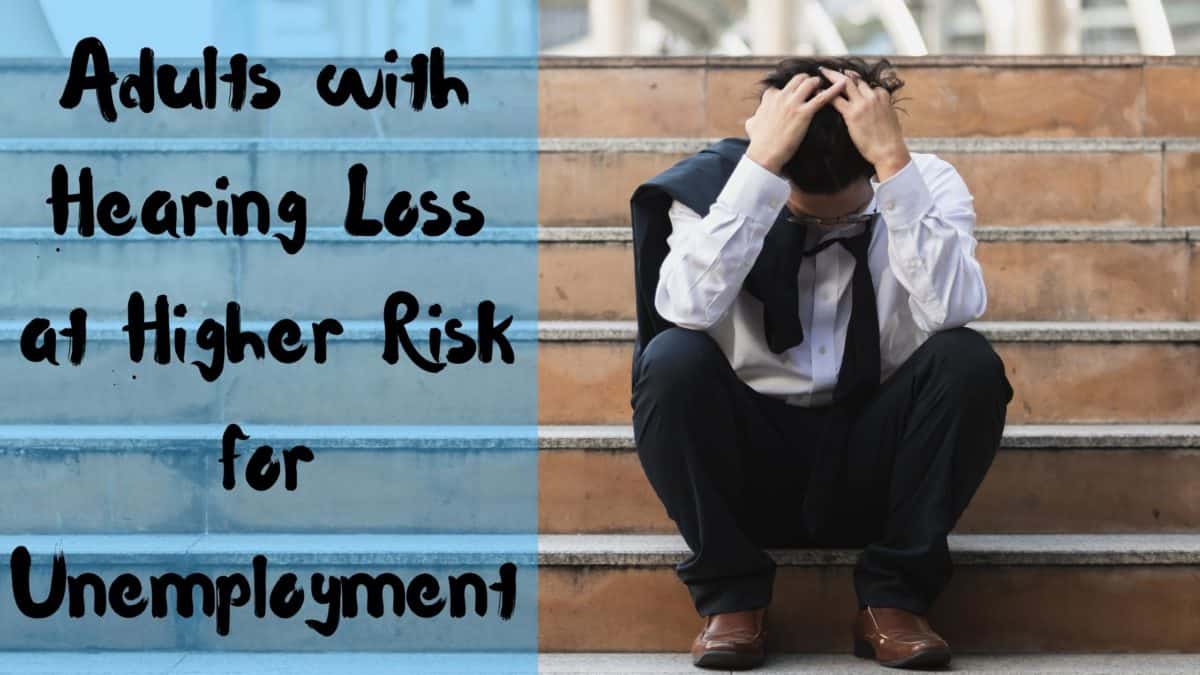- Why You Shouldn’t Do Anything With Your Earwax - April 22, 2024
- Travel Tips for People with Cochlear Implants - April 7, 2024
- How To Have A Great Conversation With People With Hearing Loss - March 22, 2024
While most hearing loss originates in the ears, it immediately becomes a communication issue, making it difficult to communicate with your family members, friends and co-workers. In the early stages of hearing loss, these communication issues can easily be ignored, but as the years continue, untreated hearing loss can lead to depression, lack of confidence and specifically in the workplace, can impact your ability to stay employed. In fact, the Hearing Health Foundation reports that individuals with severe hearing loss have an unemployment rate (15.6%), which is twice that of the average hearing population (7.8%). However, for hearing aid users, unemployment is half as high in comparison to those living with untreated hearing loss (8.3%).
The Financial Impact of Untreated Hearing Loss in the Workplace
For people with untreated hearing loss, it is all too common for constant miscommunications at work to cause co-workers and employers to find your contribution to a work environment less valuable. A recent study from the Better Hearing Institute (BHI) surveyed over 40,000 households and found that hearing loss was shown to negatively impact household income by up to $12,000 per year. The study found however that using hearing aids to treat a hearing loss was found to mitigate these affects by up to 50%! Unfortunately, of the 48 million people in the US who deal with hearing loss only 20% have ever used hearing aids. The financial impact of this in the US when compiled becomes $122 billion each year in lost wages. For the federal government, the cost at a 15% tax bracket, could be estimated to be an excess of $18 billion in unrealized taxes.
Why Does Hearing Loss Cause Such High Unemployment Rates?
For those in the workplace with untreated hearing loss it can be difficult to follow not just conversations pertaining to work. Even small talk and keeping up with casual jokes in the culture of the workplace can affect your social status. When you struggle to connect to coworkers during lunch breaks it can degrade a sense of belonging and self-confidence which is a sometimes unspoken currency.
With hearing loss, it may also be difficult to hear over background noise as your hearing loss becomes worse. For people who work in a noisy office or a factory setting the noise can easily make it easier to stay quiet and avoid connection with co-workers. In addition, this can be difficult when you may need to rely on reaction time in the workplace to keep yourself and others safe. Ultimately, when hearing loss is kept secret and unaddressed it can seem as if you are incompetent at your job. You may be much more easily passed up for promotions or even considered disposable. This is why the unemployment rate is all too high when hearing loss is unaddressed.
How to Stay Employed with Hearing Loss
One of the most important things to understand is that you have protection if you are open about your hearing loss. The Americans with Disabilities Act (ADA) was founded in 1990 to protect workers from disability-based discrimination. Hearing loss is a recognized disability under this act which protects you from just firing as long as you are able to perform the job and allows you to request accommodations to do so effectively. Everyone’s hearing loss is slightly different and different accommodations work better for different people. Some common accommodations for those with hearing loss include:
- Request to be moved to a quieter area in order to hear more effectively at work.
- Request meeting notes prior to a meeting so you can participate easily
- Request T-coil and talk to text technology to help translate what is said during important meetings and assemblies.
- Request assignments and instruction via email so you can be sure you do not miss any audio information.
Be Unapologetic and Open About your Hearing Loss.
When you are open about your hearing loss, you have a much greater chance of job security and success in your working environment. For the millions of people who suffer from hearing loss in the workplace this isn’t just about a job, but self-esteem, mental health, physical health and quality of life. If you haven’t already, take the leap, schedule a hearing test today and find out the best treatment to deal with your hearing loss and get the most out of your life.

